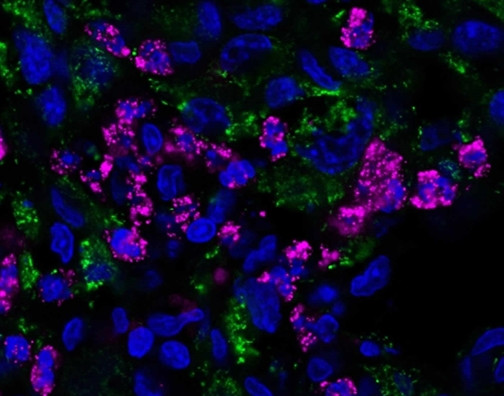Bacteria that cause food poisoning kill brain tumors
Enterobacteria of Salmonella may be a new tool against brain cancer.
The team of biomedical engineers at Duke University (USA) "recruits" the Salmonella army of bacteria , which often cause food poisoning, to join the fight against one of the most dangerous forms of cancer in the brain. is glioblastoma .
The disease is difficult to treat with drugs, because brain tissue is removed from the main blood vessels. At the same time, the doctor is also very difficult to completely remove the tumor through surgery, because the small debris remaining will produce new tumors.

Salmonella.
Even under the best medical care available, the average patient's life time is only about 15 months, and the survival rate after 5 years from diagnosis is not more than 10%.
So the research team from Duke University decided to pursue a positive treatment option with Salmonella. After some genetic changes, engineers turn bacteria into "pursuit missiles" that kill cancer by giving a self-destruct command from deep inside the tumor.
"The major challenge in the treatment of glioma is that the dispersing tumor does not have a clear edge. Therefore, only bacteria can actively find tumors, then produce self-destructing proteins with" detonators. "is a condition of hypoxia that occurs when cancer cells grow too fast," the authors said.
In addition, because the group has disabled the natural toxicity of bacteria, they will not cause any dangerous immune response to the host.

Salmonella (pink) attacks cancer cells (blue) in the experiment.(Photo: NeuroscienceNews.com).
Tests on mice at the extreme stage of the disease showed that the tumors were completely relieved, which increased the survival rate by 100 days by 20%, corresponding to 10 years of life in humans.
In the remaining 80%, the treatment did not change the life time of the experimental mice. The researchers conclude that this inactivity seems to be due to contradictions in bacterial invasion, or tumors grow faster than expected. However, all mice showed signs of positive improvement after treatment.
From the results of the study, the team of biomedical engineers at Duke University is planning to produce many different types of bacteria, while examining potential side effects to create a stronger composition in the task of pepper. kill the tumor.
- Food poisoning bacteria help treat pancreatic cancer
- The risk of food poisoning increases because the ocean is warmer
- Measures to handle when food poisoning at home
- Use 'sex virus' to kill brain tumors
- Be careful with hot day food poisoning
- Fast food poisoning detection device
- What to eat when suffering from food poisoning
- Bacteria that cause food poisoning prefer duck to beef
- Coriander essential oils can kill resistant bacteria
- Deadly bacteria in chicken can resist antibiotics
- Develop new technology for early detection of brain tumors
- Find new ways to treat brain tumors without surgery
 Why do potatoes have eyes?
Why do potatoes have eyes? 'Tragedy' the world's largest carnivorous life: Death becomes ... public toilet
'Tragedy' the world's largest carnivorous life: Death becomes ... public toilet Tomatoes were once considered 'poisonous' for 200 years
Tomatoes were once considered 'poisonous' for 200 years Detecting microscopic parasites on human face
Detecting microscopic parasites on human face